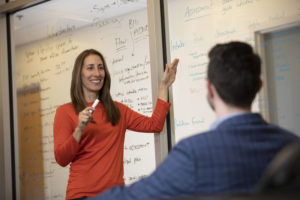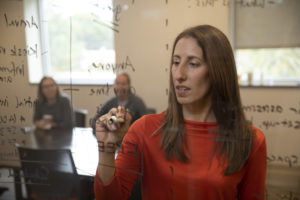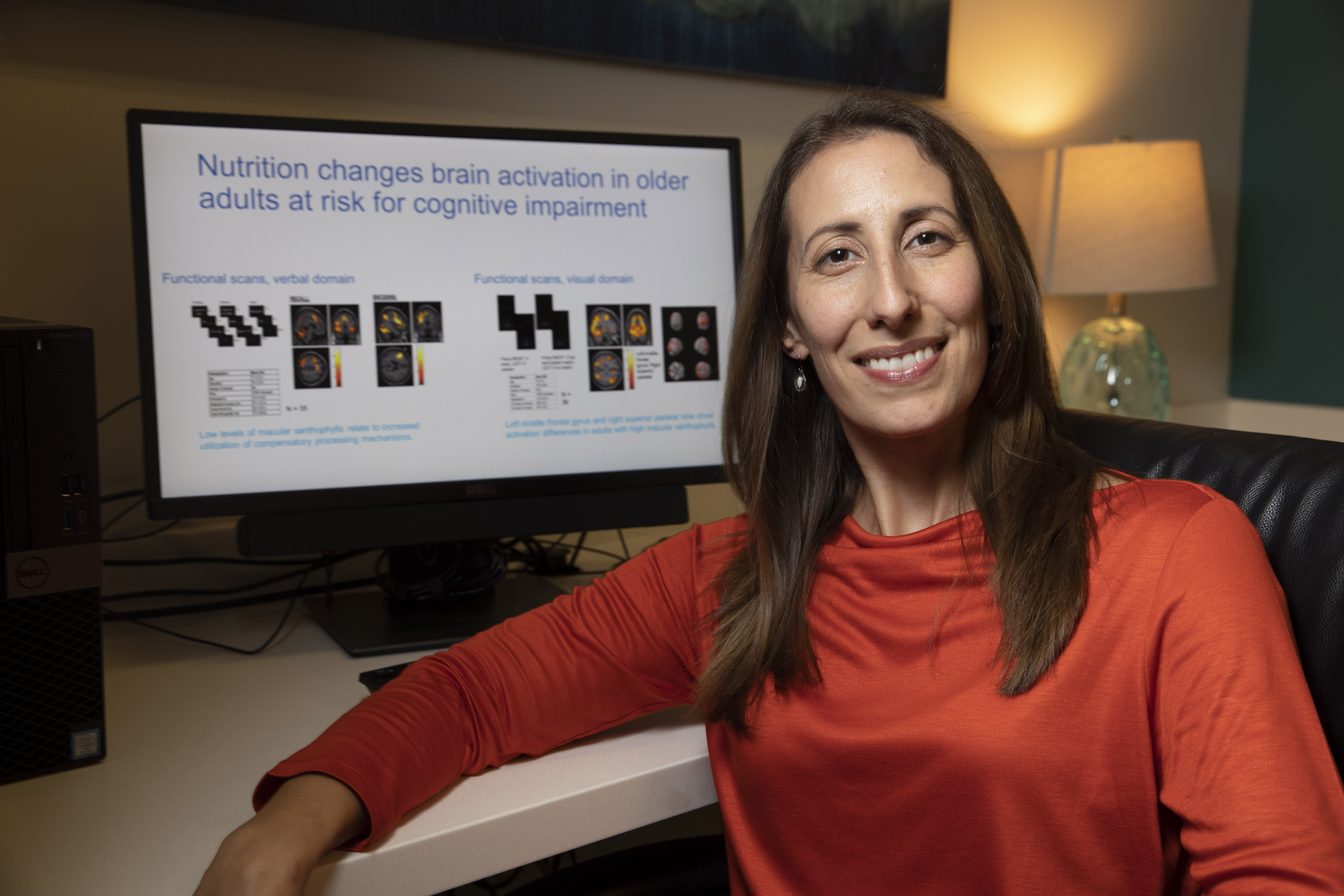Lisa Renzi-Hammond, an assistant professor in the College of Public Health, conducts research that seeks to change how our society understands and supports people living with age-related neurodegenerative diseases.
Where did you earn degrees and what are your current responsibilities at UGA?
I am a proud Triple Dawg. I earned my B.S. in psychology with high honors from UGA, and my M.S. and Ph.D. in psychology, with a concentration in neuroscience and behavior, followed shortly after. I left UGA for my postdoctoral fellowship at the University of Texas at Austin Institute for Neuroscience and Center for Perceptual Systems after completing my Ph.D. I also served as a visiting scholar at the USDA Jean Mayer Human Nutrition Research Center on Aging at Tufts University, worked as a manager in global research and development in the industry world, and made it back to UGA as a faculty member in the College of Public Health in 2017. I am currently an assistant professor in the Institute of Gerontology and the department of health promotion and behavior. I am also the director of the Human Biofactors Laboratory and have recently joined UGA’s Interdisciplinary Neuroscience Program faculty.
When did you come to UGA and what brought you here?
I came to UGA in 1999 as a student. I have to be honest; I intended to go elsewhere. As a Georgia native, I wanted to leave my home state and explore. After touring UGA in high school, I fell completely in love, mailed in my acceptance and joined the UGA Honors Program.
I never anticipated returning as a faculty member, but UGA has excellent opportunities for interdisciplinary work and truly excellent students. It is a joy to mentor students who are where I was 20 years ago and to feel like I am doing for them what my mentors did for me so long ago.
What are your favorite courses and why?
My background covers psychology/neuroscience, nutrition, sensory science and life-span development. As a member of the College of Public Health, I now have the opportunity to combine these disciplines and apply them all to big problems in our community. I have taught a number of courses at UGA in each of these individual areas, but my favorite course is a new course that I just added to UGA’s online graduate and undergraduate course catalog called “Cognition and the Aging Brain.” This course has a little something from every one of these disciplines. More importantly, though, one of my goals is to change how our society understands and deals with people living with age-related neurodegenerative diseases. Despite the magnitude of the problem for health care, we can solve this problem, but the solution needs to include education of tomorrow’s health care providers. That goal is one that I hope to start to meet in this class, in this community.
What are some highlights of your career at UGA?
I have been at UGA in multiple capacities and have experienced some wonderful things in each of them, but my most recent highlight has been watching my doctoral advisees each meet exciting milestones in their graduate careers. I could brag on them for hours—they are really quite extraordinary. At the Institute of Gerontology, the faculty have worked hard to create a warm, collegial atmosphere, and student mentoring is a big deal for us. We are so proud of our advisees!
Another related highlight has been developing close working relationships with my fellow gerontology faculty members. We have big plans and big ideas for growing the institute into a world-class, interdisciplinary research, clinical and outreach hub for gerontology. Thanks to our clinical partners, our community partners and research collaborators from across campus, we believe that we can set a new standard for studying, diagnosing and caring for people who live with dementia and their care partners.
How do you describe the scope and impact of your research or scholarship to people outside of your field?
We are all patients in a health care system. Most of us know someone who has been touched by an age-related neurodegenerative disease such as Alzheimer’s disease, age-related macular degeneration, Parkinson’s disease, etc. There are gaps in communication between researchers and clinicians, and between clinicians and patients, and most patients certainly never hear from a researcher. Closing these gaps is essential. In our laboratory and our institute, we are not only studying the disease processes themselves, but we are also studying how people living with these diseases communicate with their health providers and act based on the information they receive. If you want to make a difference in the world of neurodegenerative disease, you have to see it all the way through to the patient experience.
How does your research or scholarship inspire your teaching, and vice versa?
Many of my undergraduate students will leave the College of Public Health and go straight to medical school. My goal is that these students begin medical school with a view of their profession that is different from the typical model. Doctors should be health care providers, not disease managers. I try to help my students understand the difference. We collect data in local clinics and in our institute with patients who have a long history of health care consumption. Our students have the chance to really hear those patients and strategize how to communicate differently with them.
With respect to how my students have shaped me, I can actually picture one of my doctoral students reading this interview and laughing. My students very much set the research agenda in my laboratory. For example, our health communication initiative would never have happened without students who saw it as a problem and did the hard work to establish all the right relationships in the community.
What do you hope students gain from their classroom experience with you?
Students come in to my classes expecting a traditional neuroscience or health psychology course. My hope is that they leave those classes with a different philosophy about behavioral medicine, with a belief that big problems in health care are actually solvable, with the conviction that behavior matters, and with an entrepreneurial spirit.
Describe your ideal student.
For the past 16 years, I have asked students about what they hope to learn at UGA, and why they decided to come to college. Each day on the first day of class, students get asked this question in a questionnaire. Until recently, the answer was commonly, “To figure out my passion,” or “To understand the world.” Lately, it has been “To get X job,” or “To get in to X graduate school.” I think our students feel immense pressure to go to college to be able to “do” something, rather than to “become” something. To me, an ideal student can, for the duration of my class, be truly present. The time spent in the classroom is a time to get rid of social media, grade pressure, and preconceptions about health and society. The ideal student has a few hours a week to spare to find out who to become, instead of just what to do.
Favorite place to be/thing to do on campus is …
Health Sciences Campus is a pretty great place to be. I have spent most of my career on main campus, and now that I work primarily on health sciences, I wish I had started spending more time there as soon as we had access to it. The grounds are beautiful, the entire campus is walkable, we’re surrounded by good food, and the bike rental system is pretty amazing. I love using the campus rocking chairs in fall, with a nice, warm something to drink.
Beyond the UGA campus, I like to …
… spend time with my animals! I travel a lot in my faculty role, representing UGA at conferences and educational events, so I have to confess that my favorite spot is actually home. My husband, who is also faculty here at UGA, and I have a mini-herd of goats and a dog who loves to chase them. Scratching goats is real—it’s not digital, you can’t scratch them on a screen, and they don’t care if a journal review was unreasonable.
Community/civic involvement includes …
I am a proud volunteer for the Georgia Chapter of the Alzheimer’s Association, which is one of my favorite community partners. In the future, we’ll be working with the Alzheimer’s Association to deliver support to persons living with dementia. Our institute also works closely with the Athens Community Council on Aging, and our students and faculty spend a lot of time delivering Meals on Wheels and working with the fantastic crew at the ACCA to deliver programming. I also volunteer on the Parent Council at the University Childcare Center.
Favorite book/movie (and why)?
This is a really hard question for me, actually. I have favorites from each genre of book and movie, and it’s so hard to pick just one! I can say that one of my favorite movie moments of all time happens at the end of Charlie Chaplin’s “City Lights.” I was introduced to this film in graduate school, and I will never forget the watching the expressions on Charlie Chaplin’s and Virginia Cherrill’s faces in the last few moments of the film. There is a scene (spoiler alert!) when she realizes that the tramp on the street is really her benefactor. She has never seen him, but she recognizes him by the touch of his hand. I have never seen two people say more without words, and I think about that scene so often.
The one UGA experience I will always remember will be …
Over the now 20 years that I have spent off and on at UGA, I have had a lot of memorable experiences. One of my most recent memorable experiences was participating as part of Team Harmonized in the first cohort of the UGA site for the National Science Foundation Innovation Corps program, through Innovation Gateway. Because of that experience, I now see my research in terms of not only what we can learn, but in terms of what we can build. I see my work not just ending in research publications to share with my peers, but in products that can enter the marketplace and impact the public directly. The program changed my thinking completely about the value of our work for society.
Posted on December 1, 2019.
Originally published December 1, 2019 for UGA’s Focus On Faculty feature: https://news.uga.edu/focus-on-faculty-lisa-renzi-hammond/.








